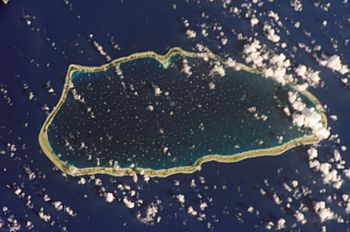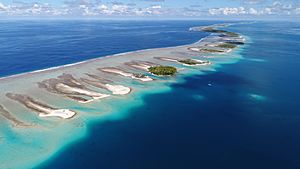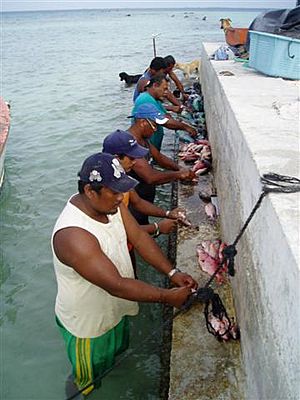Raroia facts for kids

NASA picture of Raroia Atoll
|
|
| Geography | |
|---|---|
| Location | Pacific Ocean |
| Coordinates | 16°01′S 142°26′W / 16.017°S 142.433°W |
| Archipelago | Tuamotus |
| Area | 359 km2 (139 sq mi) (lagoon) 41 km2 (16 sq mi) (above water) |
| Length | 43 km (26.7 mi) |
| Width | 14 km (8.7 mi) |
| Administration | |
|
France
|
|
| Overseas collectivity | French Polynesia |
| Administrative subdivision | Tuamotus |
| Commune | Makemo |
| Largest settlement | Garumaoa |
| Demographics | |
| Population | 233 (2012) |
Raroia, also known as Raro-nuku, is a beautiful atoll in the Tuamotus island chain. It is part of French Polynesia, a group of islands in the Pacific Ocean. Raroia is about 740 kilometers (460 miles) northeast of Tahiti. It is also just 6 kilometers (3.7 miles) southwest of another atoll called Takume.
Raroia is shaped like an oval. It is about 43 kilometers (27 miles) long and 14 kilometers (8.7 miles) wide. The land area of the atoll is about 41 square kilometers (16 square miles). In the middle of the atoll is a large lagoon (a shallow body of water) that covers 359 square kilometers (139 square miles). Boats can easily enter this lagoon.
In 2012, about 233 people lived on Raroia. The main town on the atoll is called Garumaoa. People on Raroia mostly make a living from fishing, growing copra (dried coconut meat), and pearl farming.
Contents
History of Raroia Atoll
Raroia and Takume were once known as Napaite by the ancient Paumotu people. This name means "the Twins."
Early European Visits
The first Europeans to record seeing Raroia were from a Spanish trip led by Pedro Fernandes de Queirós. They arrived on February 14, 1606. They called the island La Fugitiva, which means "the fugitive" in Spanish.
Later, in 1820, another explorer named Fabian Gottlieb von Bellingshausen saw the island. He named it Barclay de Tolly after a Russian military leader.
The Kon-Tiki Expedition
In 1947, something very famous happened at Raroia. A raft called the Kon-Tiki, led by Thor Heyerdahl, finished its long journey here. The crew had sailed for 101 days all the way from South America!
One of the crew members, Bengt Danielsson, later lived on Raroia. He studied the island's economy and how people lived. He wrote books about Raroia, including his important study called Work and Life on Raroia. In another book, Raroia: Happy Island of the South Seas (1952), he wrote that the people of Raroia were peaceful because they didn't worry about money and just enjoyed life.
Modern Travel to Raroia
In April 2006, the Raroia Airport opened. This airport helps people travel to and from the atoll. Air Tahiti flights visit the airport, though not on a regular schedule.
Life on Raroia
The people of Raroia speak two main languages: Pa'umotu and French. Pa'umotu is the local language used every day. French is taught in the elementary school in Garumaoa, the main village.
If children want to go to secondary school, they travel to the larger island of Makemo. For university, they can go to Tahiti, which is about 748 kilometers (465 miles) away.
Hospitality and Daily Life
Raroians, like most Polynesians, are known for being very welcoming to visitors. Even though there are no hotels to rent on the island, local people often invite travelers to stay in their homes.
The food on Raroia mostly includes fresh seafood caught nearby. People also eat imported bread, rice, and canned foods.
Main Industries
The two most important ways people earn money on Raroia are pearl farming and growing copra. Copra is dried coconut meat, which is used to make coconut oil.
See also
 In Spanish: Raroia (atolón) para niños
In Spanish: Raroia (atolón) para niños
 | Jackie Robinson |
 | Jack Johnson |
 | Althea Gibson |
 | Arthur Ashe |
 | Muhammad Ali |



